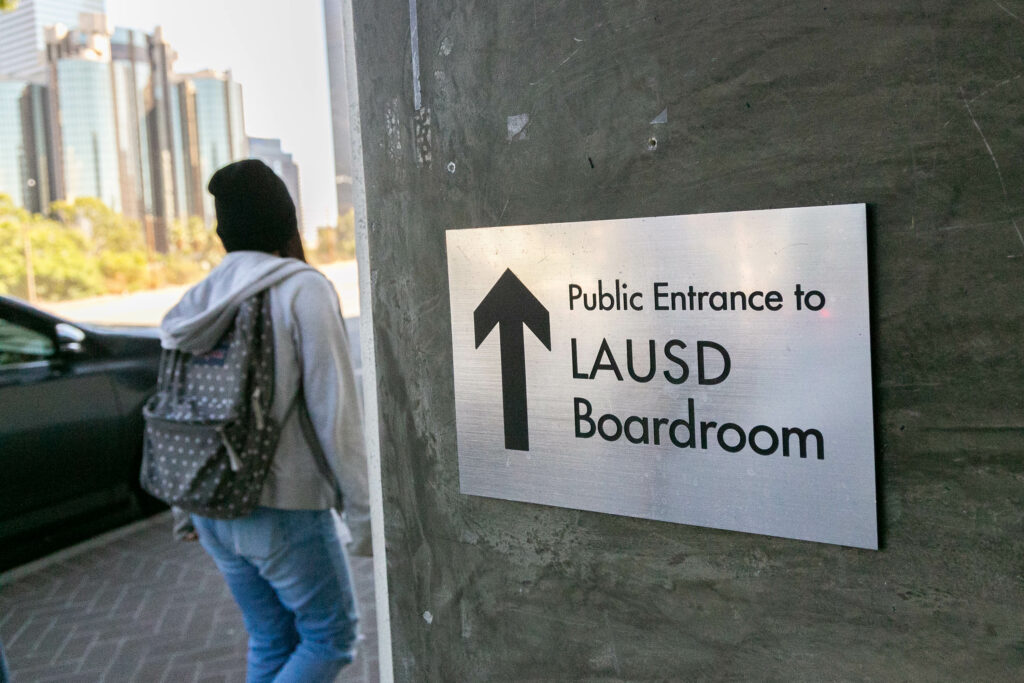Credit: Julie Leopo/EdSource
The California Charter Schools Association (CCSA) Tuesday filed a lawsuit against the Los Angeles Unified School District’s policy limiting charter co-locations on nearly 350 campuses, including the district’s 100 Priority Schools, Black Student Achievement Plan schools and community schools.
The lawsuit, filed in the Los Angeles Superior Court, argues that the policy is illegal and discriminates against charter students by not providing them with “reasonably equivalent” facilities.
“We have consistently maintained that this policy is a shameful and discriminatory attack on public charter school students, for which the district shares a responsibility to house,” said Myrna Castrejón, president and CEO of the CCSA at a press event Tuesday.
“Families choose to send their children to LAUSD charter public schools because they have found programs uniquely tailored to their needs….This policy limits options for those parents among the most vulnerable across LA Unified.”
The CCSA started making threats of litigation when the board passed the resolution on Feb. 13. The following month, the CCSA claimed the vote was invalid due to alleged Brown Act violations tied to Board Member George McKenna’s virtual participation during the February vote.
LAUSD’s school board reconvened on March 19 and passed the policy a second time with a 4-3 vote that included the support of Board President Jackie Goldberg, Vice President Scott Schmerelson and members George McKenna and Rocio Rivas.
The four board members, along with members of United Teachers Los Angeles (UTLA), have repeatedly emphasized negative effects of co-location, particularly on vulnerable students, including allegedly hostile school environments and challenges with accessing programmatic spaces, including computer labs, music rooms and art studios.
Family centers, according to Cecily Myart-Cruz, the president of United Teachers Los Angeles (UTLA) in a statement to EdSource, are also negatively impacted by co-locations.
“Implementing proper oversight and limitations on co-located schools is the fairest way to ensure that all students, regardless of their backgrounds, can access a high-quality education within LAUSD,” Myart-Cruz said in a statement to EdSource.
She added that the lawsuit filed by the CCSA is “a misguided response” to a policy widely supported by teachers, parents and students.
“All students deserve a space to thrive, and overcrowding our already resource-limited public schools has had a detrimental effect on both public and charter students,” Myart-Cruz said.
Charter proponents, however, have argued that taking nearly 350 schools off the table for co-locations could lead to more multi-site offers and school closures, which they say will negatively impact vulnerable students.
The lawsuit specifically states that the 240 charter schools in LAUSD educate more than 115,000 students, who are largely low income and students of color.
The lawsuit also claims that the district has failed to collaborate in good faith and points to a history of alleged violations to Proposition 39.
“Despite CCSA and the charter public school communities’ offer to work collaboratively with the board on a new policy that would improve the process of sharing campuses, LAUSD has disregarded the voices and needs of charter school families and adopted a new policy to harm their charter schools,” Castrejón added at Tuesday’s press event.
LAUSD declined to comment on the lawsuit as litigation is pending.
Meanwhile, the CCSA emphasized their strong legal track record and said they feel optimistic about the case.
“It is a common theme with LAUSD,” said CCSA’s vice president of legal advocacy and executive director Julie Umansky on Tuesday. “We’re feeling confident with the precedent on their disregard for Prop 39 and our ability to get the court to see it the way we do.”

